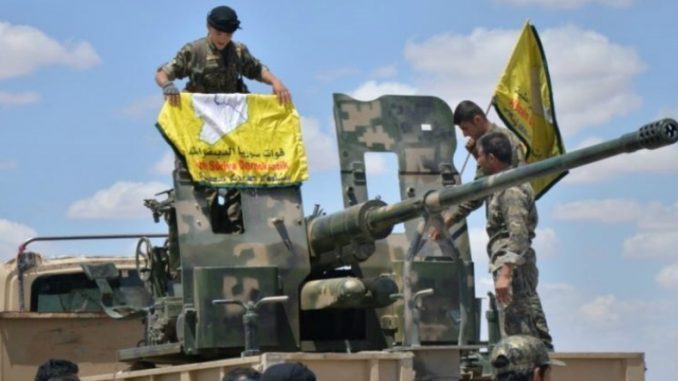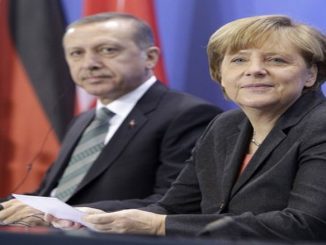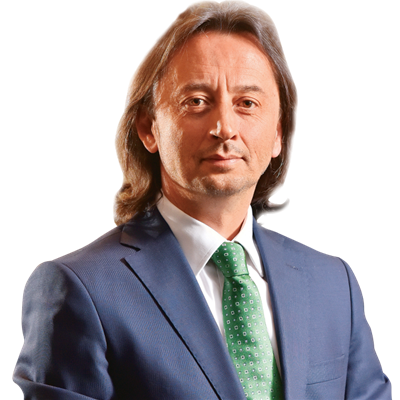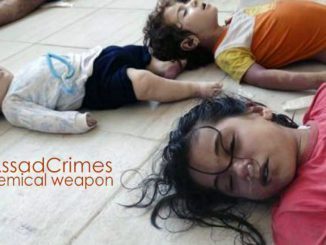
Kurdish sources Russia is setting up a military base in northwestern Syria in agreement with the Syrian-Kurdish YPG armed militia, while Moscow denied this news.
The Syrian Democratic Forces (SDF) alliance, which is dominated by the Kurdish YPG militia, is supported by the US as the latter uses them in its war against ISIS.
The US support gave the Kurdish militias the upper hand to control large areas in northern Syria, leading them in the end to establish three autonomous administrations in Kurdish-dominated areas.
Air strikes carried out by the US-led coalition and a long fight by the SDF forces ended in recapturing Manbij from the control of the Islamic State (ISIS) group last year, and they sought then to control al-Bab city to link their cantons together but the Turkish military intervention prevented them.
Turkey sees the YPG as an extension of Kurdish PKK militants, who have waged a three-decade insurgency in southeastern Turkey, and sought therefore to sideline the Kurdish role in Raqqa operations but failed until now to achieve this goal.
In addition to the US, Russia has cooperated with the Kurds in northern Syria despite Turkey’s refusal.
Russia to build a military base
The agreement with Russia was concluded on Sunday and Russian troops have already arrived at the village of Kafr Jina, in the northwestern region of Afrin, with troop carriers and armoured vehicles, YPG spokesman Redur Xelil told Reuters news agency.
“The Russian presence … comes in agreement between [the YPG] and the Russian forces operating in Syria in the framework of cooperation against terrorism and to help train our forces on modern warfare and to build a direct point of contact with Russian forces,” Xelil said in a statement.
“It is the first [agreement] of its kind,” he added.
Such an agreement would further illustrate how the Syrian Kurds have managed to bring both Washington and Moscow onto their side after showing themselves as an organized force able to confront jihadist groups and take back territory from Islamic State.
A Russian deployment would help deter cross-border attacks against the Kurdish-dominated area of Afrin from Turkey, which is hostile to the YPG, seeing it as an arm of the Kurdistan Workers Party (PKK) that is pressing an insurrection in Turkey.
Turkish Deputy Prime Minister Numan Kurtulmus said in response to a question on Afrin that Ankara would never allow what he called a “terror region, a terror state” to be established in northern Syria,” in reference to the YPG.
“We have conveyed this to all interested parties in almost every meeting. The Russians know this, and the Americans know this and other countries know this,” Kurtulmus said during a news conference in Ankara.
Kafr Jina has previously been shelled by Turkish forces from across the nearby frontier, Xelil added.
“The agreement came into force today,” Xelil said, declining to say how many Russian troops had arrived in Kafr Jina, the place where the base is being established.
However, the Russian Defense Ministry said it had embedded servicemen with the YPG in northern Syria, but said the servicemen were there to monitor a ceasefire between the Kurdish forces and Turkey-backed opposition fighters, not to establish a base. The ministry said the units had been deployed from its Center for Reconciliation at its air base in Hmeimim in northwestern Syria.
“There are no plans to establish new Russian bases on the territory of the Syrian Arab Republic,” Russian Defense Ministry said in a statement.
100.000 Kurdish fighters
The Kurdish source added that Russia aims also to train the Kurdish militias, as the YPG aims to expand its fighting force by nearly two-thirds to more than 100,000 fighters.
The group had about 60,000 fighters at the end of 2016, he said, and has already formed 10 new battalions – each comprised of 300 fighters – since the start of this year.
The 10 new units and other new battalions to be formed this year will be trained in all forms of combat, weaponry and tactics, with the aim of turning the YPG into a more organised force that resembles a traditional army, Xelil said.
“A disciplined, cohesive military force, well-trained in different tactics of war … is the true guarantee to defend us and to affirm our presence as a great nation that deserves dignity,” said a YPG leaflet seeking recruits for the new battalions that has been circulated in the predominantly Kurdish regions of Syria, which is home to roughly two million Kurds.
Each fighter will reportedly receive a monthly salary of $200, which is $20 above the maximum wage currently paid to YPG fighters.
Aaron Stein, a senior fellow at the US-based Atlantic Council, told AFP news agency that Russia was now partnering with the Kurds as they had become an important player in Syria.
“The Kurds are now the most consequential non-state actor in Syria, alongside al-Qaeda… They will have a huge say over the future of Syria,” Stein said.
YPG commander Sipan Hemo said YPG aimed to “fight terrorism” everywhere in Syria, while its political priority was “guaranteeing the rights of the Kurdish people in Syria legally, constitutionally”.
He also signalled a readiness on the part of YPG to reach a long-term accommodation with the Syrian government, saying “there will be no problem with the regime” once Kurdish rights are secured.
The Syrian crisis began as a peaceful demonstration against the injustice in Syria. Assad regime used to fire power and violence against the civilians and led to armed resistance. 450.000 Syrians lost their lives in the past five years according to UN estimates, and more than 12 million have lost their homes.



